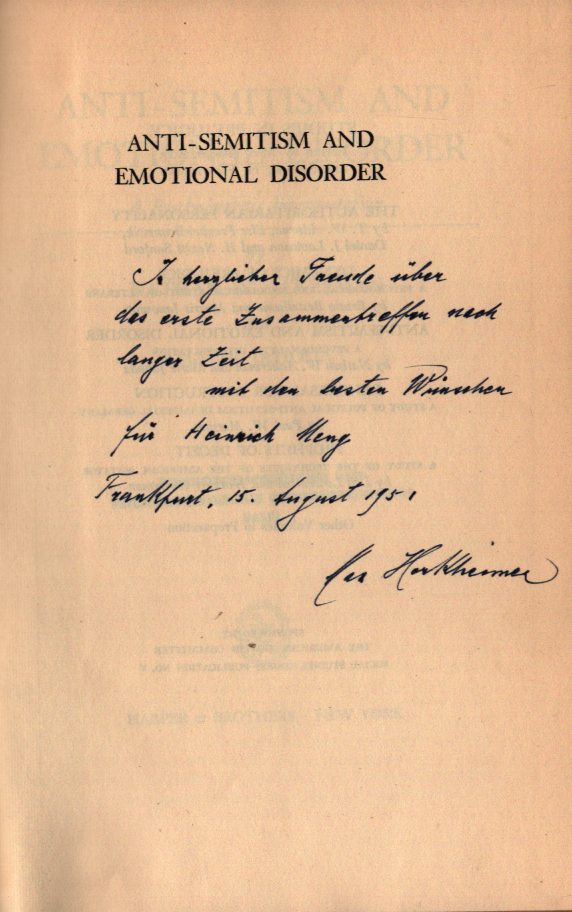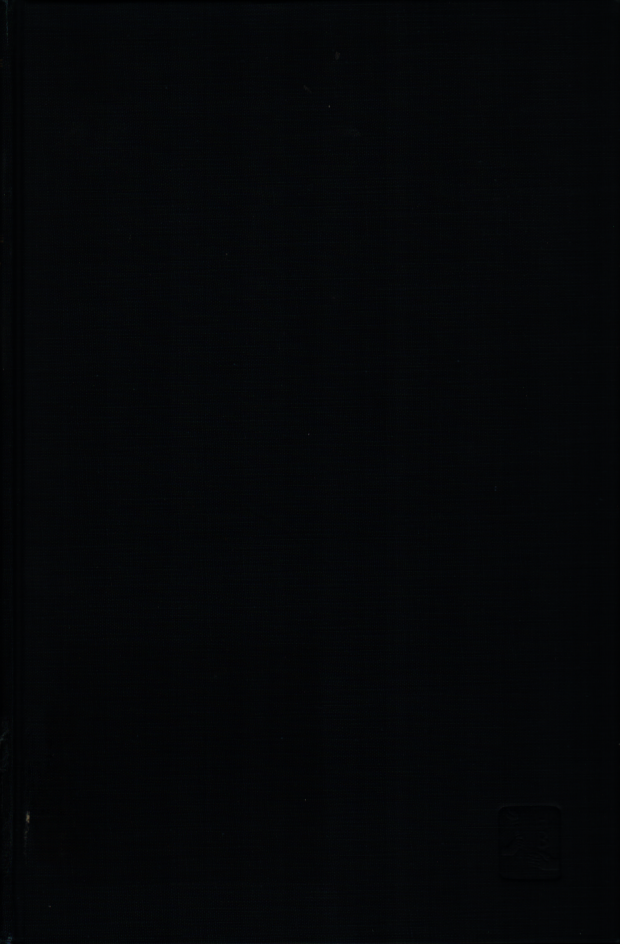Details
| Autor | Ackermann, Nathan W.; Jahoda, Marie |
|---|---|
| Verlag | Harper and Brothers Publ., New York |
| Auflage/ Erscheinungsjahr | 1950, EA |
| Einbandart/ Medium/ Ausstattung | OLn.mit goldgeprägtem Rücken- u. Deckeltitel |
| Seiten/ Spieldauer | 135 Seiten |
| SFB Artikelnummer (SFB_ID) | SFB-010409_AQ |
WIDMUNGSEXEMPLAR aus dem Bestand einer wissenschaftlichen Bibliothek mit Stempel auf dem Titel, Signaturreste am Einband sowie leichten altersgemäßen Gebrauchsspuren, insgesamt sauber und gut erhalten. - Auf dem Vorsatz mit einer persönlichen Widmung Max Horkheimers in Tinte und in seiner akkuraten Handschrift für den deutsch-schweizerischen Psychoanalytiker Heinrich Meng: "In herzlicher Freude über das erste Zusammentreffen nach langer Zeit / mit den besten Wünschen für Heinrich Meng / Frankfurt, 15. August 1951 / Max Horkheimer".
Max Horkheimer war von dieser Arbeit seiner amerikanischen Kollegen so angetan, daß er dieses Buch über die psychologischen Wurzeln des Antisemitismus als Geschenk für Heinrich Meng auswählte und gerade diesen Titel mit seiner Widmung versah.
Introduction by Carl Binger
"The Authors of this book have attempted to describe and to define, in a clinical study, an ancient, baffling, and perplexing social problem. Since their training and experience lies in psychoanalysis and social psychology they have examined their material from the theoretical bases on which these sciences rest. This is their point of view, their stand. But they give full recognition to the importance of other ones - ethnic, for example, or economic. For anti-Semitism is a many-headed hydra. Each head that is cut off is replaced by two others, unless a burning iron is applied to the wound. The authors know how to use the cautery. But it will take a Hercules to do the monster in.
You may say that Dr. Ackerman and Dr. Jahoda are prejudiced against anti-Semitism. Yes, in the same way that Pasteur was prejudiced against rabies; Koch against tuberculosis; Walter Reed against yellow fever; or Harvey Cushing against brain tumors. Each one of these scientists spent his genius, or his courage, or both, to attack an evil. The evil was disease. Their method of attack was the cool and careful method of science. But they had formed a prejudgment which might be stated in this way: "It is better for man to inherit the earth than it is for rabid dogs or tubercle bacilli or mosquitoes."
In the same way Doctors Ackerman and Jahoda have formed a prejudgment. They consider anti-Semitism an evil; a symptom of social illness. They are courageous enough to do battle with evil, using the combined weapons of their respective sciences. Since the application of psychoanalytic theory to social phenomena is at its beginning this is pioneering work. It is important, however, not only for that, but also because in bringing reason to bear on certain irrational attitudes the authors of this book have struck a blow at once for freedom and for mental health. The day is now past when the true scientist can be indifferent to ethical values and moral judgments.
If the quality of mercy is twice blessed, the quality of anti-Semitism bears a double curse. It curses him who gives and him who receives. In its country club and summer hotel guise it may appear only to enhance what Freud called "the narcissism of small differences." But even when it does not deprive Jews of life and liberty, anti-Semitism is an obscenity and a sin against the human spirit.
In a world that appears, just now, to be entering a state of fission, how heartening to find two experienced investigators who have had the faith and patience to tackle so difficult a problem. They have done it with skill and with dignified sincerity. Jew and Gentile alike owe Dr. Ackerman and Dr. Jahoda a debt for their labors. it is easy to be cynical. It is much harder to get down to work. (...)"
Inhalt
FOREWORD TO STUDIES IN PREJUDICE V
INTRODUCTION by Carl Binger
PREFACE
I. THE SETTING FOR THE STUDY OF ANTI-SEMITISM
- A. Cultural Climate and Social Research
- B. Value Judgments and Potential Bias
- C. Some Underlying Concepts
1. Prejudice
2. Normalcy
3. National Character
II. DATA COLLECTION AND METHODOLOGICAL CONSIDERATIONS
- A. Methodological Approach and Purpose of the Study
- B. Data Collection
- C. Specific Methodological Considerations
1. The Selective Character of the Material
2. The Development of Conceptual Tools
III. THE PSYCHODYNAMICS OF ANTI-SEMITISM
- A. The Clinical Picture
1. Diagnosis and Symptoms
2. Emotional Predispositions to Anti-Semitism
a. Anxiety
b. Confusion of the Concept of Self
c. Interpersonal Relations
d. Conformity and the Fear of the Different
e. Reality Adaptation
f. Conscience Development and Repression - B. The Cenetic Aspect
1. Relationship Between the Parents of the Anti-Semite
2. The Relationship of the Parents to the Anti-Semitic
Patients as Children
3. The Oedipal Struggle - C. Anti-Semitism in the Service of Defense Mechanisms 55
1. Projection
a. The "Selective" Anti-Semite
b. The "Unselective" Anti-Semite
2. Denial
3. Social Aggression Substituted for Anxiety
4. Displacement
5. Reaction Formation and Compensation
6. Introjection - D. Group Pressures and Intrapsychic Needs
1. The Social Determination of the Stereotype
2. The Social Determination of Anti-Semitic Manifestations
3. Jewish Anti-Semitism
4. The "Liberal" Anti-Semite
5. Contact with Jews
6. Anti-Semitism in the Family
IV. ANTI-SEMITISM IN CONTEXT
V. APPENDIX: SUMMARY INFORMATION ON ALL CASES
VI. BIBLIOGRAPHY
Index
Aus der Einleitung
Max Horkheimer (* am 14. Februar 1895 in Zuffenhausen - + am 7. Juli 1973 in Nürnberg) war ein bedeutender deutscher Sozialphilosoph und führender Kopf der Frankfurter Schule.
Heinrich Meng (* 9. Juli 1887 in Kehl - + 10. August 1972 in Basel/Schweiz) war ein deutsch-schweizerischer Psychoanalytiker und Begründer der europäischen Bewegung der Psychohygiene. Sprache: Englisch Gewicht in Gramm: 650 8°, gebundene Ausgabe, schwarzer Ganz-Leineneinband mit goldgeprägtem Titel auf dem Buchrücken. Bestandsnummer des Verkäufers 26078



Kommentare
Schreiben Sie den ersten Kommentar!
Neuer Kommentar
Bitte beachten Sie vor Nutzung unserer Kommentarfunktion auch die Datenschutzerklärung.